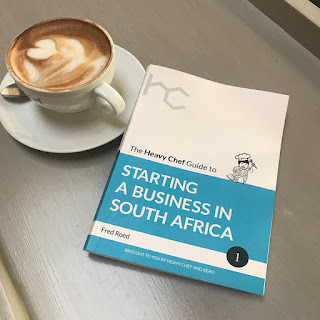The Heavy Chef Guide To Starting a Business - Internal Training Experiment (Part 3)
Welcome to Part 3 of our internal "entrepreneur training" series we're doing at forgood.
Using the Heavy Chef Guide to Starting a Business in South Africa (it's a super light read and presents quite a nice structure for the do's and don'ts of getting going in business) - we're doing bi-monthly learning sessions, discussions and exercises.
I'll chronicle them here so you can follow along.
If you missed Part 1 and Part 2, go give them a read. If you're wondering why we're training our team to be entrepreneurs? I'd have to say: why not?
These are great "tick box" chapters. A big list of things to check out and check off when you're investigating your business idea or even starting a new project within your current job. Here are the themes we're picking up on...
There is almost no barrier to entry to starting something
I loved the idea of a "wantepreneur". The talkers. The ones who attend networking meetings more than sales meetings. Or the startups that exhibit the same behaviour: no clients, no discernible revenue streams - but lots of noise.
Always wondered how they made money.
Don't be a "wantepreneur". Starting a business has never, ever been easier. Either register online with CIPC or use these new entrepreneur hubs like the DHL Express Shops where you can do printing, shipping, laminating - and you guessed it, register a company.
It's the litmus test, isn't it? Someone selling you an idea/service who hasn't bothered to register a company. I'd say registering a company is the most important second step - after testing said idea. You don't need a lot of funding. It's a psychological commitment. It says you're serious.
There's only one disclaimer to this. There are some pretty cool tax benefits if you're running a lone consulting/speaking "business" under your own name. Just don't do anything that's going to attract significant liability - they may attach your car and house if things go pear-shaped.
Cool tools for the cloud generation
Talking about lower barrier to entry for business - the suite of tools available to any SME these days is truly astonishing.
My tip - don't be scared to pay a little. Many services are free, but don't turf better solutions because they cost R40/month. When you're starting something, the last thing you want to be worrying about is your email service or access to spreadsheets.
Here's a quick list of the tools we use at forgood... I wanted to share some indicative costs to give you an idea that these really aren't expensive services. They do change based on R/$ and obviously the number of users you require.
See you in 2 weeks time for the next post!
Using the Heavy Chef Guide to Starting a Business in South Africa (it's a super light read and presents quite a nice structure for the do's and don'ts of getting going in business) - we're doing bi-monthly learning sessions, discussions and exercises.
I'll chronicle them here so you can follow along.
If you missed Part 1 and Part 2, go give them a read. If you're wondering why we're training our team to be entrepreneurs? I'd have to say: why not?
Chapter 3 and 4
These are great "tick box" chapters. A big list of things to check out and check off when you're investigating your business idea or even starting a new project within your current job. Here are the themes we're picking up on...
There is almost no barrier to entry to starting something
I loved the idea of a "wantepreneur". The talkers. The ones who attend networking meetings more than sales meetings. Or the startups that exhibit the same behaviour: no clients, no discernible revenue streams - but lots of noise.
Always wondered how they made money.
Don't be a "wantepreneur". Starting a business has never, ever been easier. Either register online with CIPC or use these new entrepreneur hubs like the DHL Express Shops where you can do printing, shipping, laminating - and you guessed it, register a company.
It's the litmus test, isn't it? Someone selling you an idea/service who hasn't bothered to register a company. I'd say registering a company is the most important second step - after testing said idea. You don't need a lot of funding. It's a psychological commitment. It says you're serious.
There's only one disclaimer to this. There are some pretty cool tax benefits if you're running a lone consulting/speaking "business" under your own name. Just don't do anything that's going to attract significant liability - they may attach your car and house if things go pear-shaped.
Cool tools for the cloud generation
Talking about lower barrier to entry for business - the suite of tools available to any SME these days is truly astonishing.
My tip - don't be scared to pay a little. Many services are free, but don't turf better solutions because they cost R40/month. When you're starting something, the last thing you want to be worrying about is your email service or access to spreadsheets.
Here's a quick list of the tools we use at forgood... I wanted to share some indicative costs to give you an idea that these really aren't expensive services. They do change based on R/$ and obviously the number of users you require.
- Afrihost. We use their super cheap Wordpress hosting and domain management for The forgood Blog. R39/m.
- Amazon Route 53. Cloud DNS. R9/m.
- BulkSMS. Simple SMS portal, useful for notifications for users or business stakeholders. Price varies based on the amount of pre-paid SMS bundles you buy.
- Canva. Image editing. FREE.
- Dropbox. By far the easiest way to share lots of stuff with lots of people - big bonus is instant backup of all your business documentation and extensive version control. R1684/m for 7 users.
- Evernote. Useful for shared notebooks of client to do's, research, brainstorms etc. FREE.
- FreshDesk. Ticket management for all inbound channels, nice way to measure First Response and Resolution SLA's. R1700/m.
- PurelyHR. Leave management. A bit yuck, but it works. FREE (as far as I know).
- GitHub. Our code repository and developer ticket tracking system. R594/m.
- G Suite / Google Apps. Email, calendar, contacts and some light usage of Google Docs / Sheets. We tried using Google Drive but it failed horribly - I suspect that if you start from scratch, Google Drive will be fine. But trying to seed it with 14,000 files across multiple users, especially since Macs have a host of hidden files to confuse things, just didn't work. R911/m for 10 users.
- JetBrains. Plugin for Visual Studio that increases developer efficiency. At least that's what they tell me! R419/m.
- Mailchimp. Email marketing service - for about 25k strong database. R2084/m.
- Microsoft Azure. Say what you like, Microsoft is changing as a company, becoming a little more palatable than before. And if you're in the enterprise SaaS game, this opens doors. Rlots/m.
- Microsoft Office. Still the corporate standard when you deal with... corporates. Next business will be G Suite only. Per license costing.
- PixaBay. Royalty free images. FREE.
- PreRender. Nifty middleware to help search engines index single page applications (like the Aurelia front end we're currently using). R209/m.
- Retently. Our NPS (Net Promoter Score) system, sent to all users in the forgood ecosystem. Very simple and effective way to measure "product quality and experience". R500/m.
- SERanking. Powerful SEO tool to monitor your rankings and doing on-demand website audits to cleanup your SEO strategy. R600/m.
- Slack. We tend to use this more from laptops than mobile - but it's a nifty tool. Certainly hasn't replaced email though. FREE.
- Visual Studio. Dev in a Microsoft Environment. FREE.
- Whatsapp. Still the easiest team communication method. FREE.
- ZenHub. Turns GitHub issues into Kanban columns. Better to have sticky notes on the wall if you're a small team (which we do as well). FREE.
Getting an idea or a business from Zero to One is bloody hard. But unfortunately - it doesn't get much easier. Isn't it funny how much time entrepreneurs spend trying to convince other entrepreneurs not to be entrepreneurs?
Anyway. I've always had a theory that people are often suited to different parts of the business life cycle.
Anyway. I've always had a theory that people are often suited to different parts of the business life cycle.
0 to 1. The Gritty Grinders. These entrepreneurs that can create something out of nothing, no matter how large or small. You're a builder, you're a hustler and you have a way of forcing things to happen despite overwhelming odds. Sometimes, it's just to survive. Other times, it's the start of a bigger journey. This space is messy and you often have to sacrifice quality in favour of execution. Be lean, baby!
1 to 10. Growth Entrepreneurs. Doesn't matter how you look at this number - it could be number of employees or turnover in the millions. Different skills are required to take an early stage / seed business and get it to the point of a stable, growing and interesting SME. We're talking client relationships, sales pipelines, accounting standards, HR, team culture, fundraising and more.
10 to 100. High Growth Entrepeneurs. These are the scale-ups everyone is talking about. You're out of the SME space now. Structure is important. Process optimisation, profit optimisation, governance, strategic alliances, investor relations, PR, delegation - these words are your new lexicon.
100 to 1000. Towards IPO and Exit. Precious few entrepreneurs manage to get here - and interestingly enough, many choose to remain in earlier spaces. A profitable lifestyle business is a hard proposition to turn away in this day and age. I don't feel qualified to write on this space - but I can only imagine it's a rocket ship that you don't have a high degree of control over.
And then of course, you have the consolidators / maintainers / jobbers. And you often find them working for corporates. Nothing wrong with that, no company can grow without people to do the work. Love 'em and pay 'em accordingly!
Where do you sit?
Where do you sit?
Business Partners
I'll keep this one short. Never. Ever. Go it alone.
Read My Street MBA for the reasons why. If you're in tech, the hustler/hacker combo is essential. If you're in business, the Heavy Chef Guide as a great checklist for the things you need to look for in a business partner and why it's so important.
I'm not saying it's impossible to build something yourself, just that it sucks. Big time.
See you in 2 weeks time for the next post!




Comments
Post a Comment